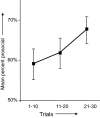Giving is self-rewarding for monkeys
- PMID: 18757730
- PMCID: PMC2533250
- DOI: 10.1073/pnas.0807060105
Giving is self-rewarding for monkeys
Abstract
Helping and sharing among humans is often motivated by empathy and accompanied by a sense of satisfaction. To determine whether similar self-rewarding mechanisms may underpin assistance among nonhuman primates, eight female brown capuchin monkeys (Cebus apella) underwent testing in a simple choice paradigm. Paired with a partner, subjects could select either a "selfish" option that rewarded only themselves, or a "prosocial" option that rewarded both of them. Subjects systematically favored the prosocial option provided their partner was a) familiar, b) visible, and c) receiving rewards of equal value. Prosocial tendencies increased with social closeness, being lowest toward strangers and highest toward kin. That the monkeys understood the options was suggested by greater orientation to the partner during prosocial than selfish choices. Prosocial preferences were reduced by inequity, when the partner received a superior reward. If the view between both monkeys was blocked, choices became strikingly selfish. Thus, under certain conditions, delivering benefits to others seems gratifying to nonhuman primates.
Conflict of interest statement
The authors declare no conflict of interest.
Figures



References
-
- Trivers RL. The evolution of reciprocal altruism. Q Rev Biol. 1971;46:35–57.
-
- Hamilton WD. The genetical evolution of social behaviour. I & II. J Theor Biol. 1964;7:17–52. - PubMed
-
- de Waal FBM. Putting the altruism back into altruism: The evolution of empathy. Ann Rev Psychol. 2008;59:279–300. - PubMed
-
- Batson CD. The Altruism Question: Toward a Social Psychological Answer. Hillsdale, NJ: Erlbaum; 1991.
Publication types
MeSH terms
Grants and funding
LinkOut - more resources
Full Text Sources

